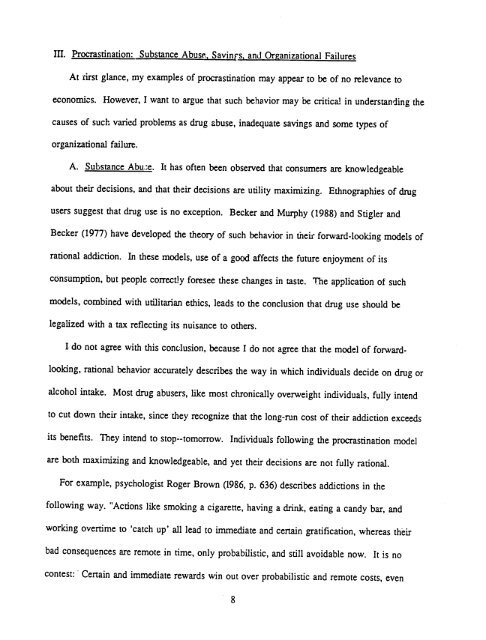INSTITUTE FOR
INSTITUTE FOR
INSTITUTE FOR
You also want an ePaper? Increase the reach of your titles
YUMPU automatically turns print PDFs into web optimized ePapers that Google loves.
III. Procrastination: Substance Abuse, Savinfs, and Organizational Failures<br />
At rirst glance, my examples of procrastination may appear to be of no relevance to<br />
economics. However, I want to argue that such behavior may be critical in understanding the<br />
causes of such varied problems as drug abuse, inadequate savings and some types of<br />
organizational failure.<br />
A. Substance Abu;e. It has often been observed that consumers are knowledgeable<br />
about their decisions, and that their decisions are utility maximizing. Ethnographies of drug<br />
users suggest that drug use is no exception. Becker and Murphy (1988) and Stigler and<br />
Becker (1977) have developed the theory of such behavior in their forward-looking models of<br />
rational addiction. In these models, use of a good affects the future enjoyment of its<br />
consumption, but people correctly foresee these changes in taste. The application of such<br />
models, combined with utilitarian ethics, leads to the conclusion that drug use should be<br />
legalized with a tax reflecting its nuisance to others.<br />
I. do not agree with this conclusion, because I do not agree that the model of forwardlooking,<br />
rational behavior accurately describes the way in which individuals decide on drug or<br />
alcohol intake. Most drug abusers, like most chronically overweight individuals, fully intend<br />
to cut down their intake, since they recognize that the long-run cost of their addiction exceeds<br />
its benefits. They intend to stop--tomorrow. Individuals following the procrastination model<br />
are both maximizing and knowledgeable, and yet their decisions are not fully rational.<br />
For example, psychologist Roger Brown (1986, p. 636) describes addictions in the<br />
following way. "Actions like smoking a cigarette, having a drink, eating a candy bar, and<br />
working overtime to 'catch up' all lead to immediate and certain gratification, whereas their<br />
bad consequences are remote in time, only probabilistic, and still avoidable now. It is no<br />
contest:' Certain and immediate rewards win out over probabilistic and remote costs, even<br />
8

















